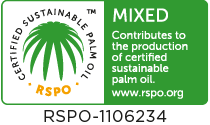SPOTS® INITIATIVE

Bio-based chemicals have the potential to significantly reduce greenhouse gas emissions and to reduce dependence on fossil fuels. Clariant therefore strives to use bio-based raw materials, where this makes sense from an economic, environmental and social point of view. Palm oil is the most widely used renewable raw material at Clariant, particularly in personal care products and household cleaners. Clariant uses chemicals based on natural oils from palm fruits and palm kernels in surfactants, emulsifiers and preservatives; as an additive for crop care; and in industrial applications. The use of renewable raw materials can contribute to a more sustainable profile of the products. However, palm oil is a topic of public debate because of negative environmental effects and adverse social impacts with cultivation. Clariant thus has intensified its efforts to ensure the sustainability of palm oil sources and is going to focus on three work pillars to achieve sustainable sourcing of its palm materials:
- RSPO Supply Chain Certification,
- Traceability, which is to a large extent outside of the RSPO supply chain scope,
- Value chain collaboration projects to implement and push both: RSPO certification and traceability.

Clariant has teamed up with Wilmar International Ltd, their joint venture The Global Amines Company, Wild Asia a local social enterprise and L’Oréal to educate Malaysian palm oil small producers on sustainability, certification and supply chain traceability – and increase productivity by 20 percent until 2020.
Over five years the project partners will not just enable 500 palm fruit farmers in the Sabah, Beluran District in Malaysia to achieve their RSPO certification. SPOTS® – Sustainable Palm Oil and Traceability with Sabah small producers – will also connect independent palm oil and palm kernel oil producers to the global market by purchasing RSPO Mass Balance certified material. The project aims to ensure economic development of small-scale producers by giving them access to global markets, introducing better cultivation practices and creating environmental benefits by engaging small producers in sustainable palm trees cultivation through RSPO certification.
In addition, SPOTS® is working to increase traceability in the complex palm derivative business, paving way towards enhanced transparency demanded by today’s consumers of Personal Care products. For the first time, it links competent global market players with small producers in Malaysia through all stages in the supply chain, from the palm feedstock to the final cosmetic product. While there is increasing pressure for smallholders to be more sustainable, the companies which buy palm oil from growers also have to pay the price premium for certified palm oils. SPOTS® smallholders sell their harvests to Wilmar mills, and L’Oréal in turn buys the palm oil to fulfill their zero-deforestation and sustainable sourcing policy.
SPOTS® has been initiated as part of L’Oréal’s solidarity sourcing programme allowing small producers to improve their living standards and achieve the partners respective commitments to sustainability and »Zero deforestation« ambition.
Sustainable Palm Oil and Traceability with Sabah small producers (SPOTS®)
Sabah smallholders
500 smallholders in Sabah (Malaysia) are part of the SPOTS® Initiative, which enables them to produce RSPO-certified palm oil while securing their standard of living.
Wilmar
Asia’s leading agribusiness is committed to sustainable agriculture. Wilmar’s strategy is based on the prevention of deforestation, land reclamation, and exploitation. With the support of small farmers, the company secures their livelihoods, the environment and its own supply chain.
Global Amines Company
The joint venture between Clariant and Wilmar combines technical expertise with the integrated agribusiness of the two companies.
Clariant
Clariant is committed to the sustainable sourcing of palm-based ingredients by developing traceability and a zero-deforestation approach. With strong partnerships, the company is working on the right balance of economic, social and ecological interests.
L’Oréal
Since 2012, the global cosmetics leader has made 100% of its palm oil purchases according to the RSPO standard. L’Oréal’s goal is to exclusively purchase palm oil from sustainable sources by 2020 and not use products that might be linked to deforestation.
Wild Asia
The non-profit company supports smallholders by ensuring that social and environmental aspects are met by the global partners and the farmers can achieve RSPO certification.
At the same time, Clariant will certify all relevant locations that process products made from palm oil according to the RSPO mass balance criteria by the end of 2016. This certification attests to the locations’ monitoring of the quantity of certified palm oil in the production process in such a way that a certain mass balance between certified and non-certified palm oil can be met. The German plant in Gendorf was the first to be certified in 2014 in accordance with this standard. This is an important step towards completely separated raw material streams. Clariant aspires to organize and certify the locations by 2020 in such a way that the complete separation of certified and non-certified palm-based raw materials can be met. This also allows the company to continuously meet the requirement from customers who increasingly request certified products.
A substance added to products in small quantities to achieve certain properties or to improve a product (Clariant Business Unit Additives). VIEW ENTIRE GLOSSARY
